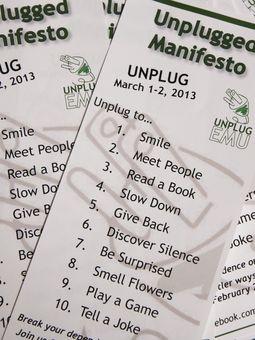DETROIT — Davy Rothbart’s to-do list this weekend includes reading and walking along a river trail.
What it does not include is making calls, checking email or texting.
The 37-year-old from Ann Arbor is among thousands of people across the United States who are expected to turn off their smartphones and other electronic devices for 24 hours to observe the National Day of Unplugging. Part of the Sabbath Manifesto, the campaign is designed to get people to slow down in an increasingly hectic world, an idea inspired by that most un-Microsoft of documents, the Old Testament.
In short, God rested on the seventh day — and so should you.
And like the Jewish Sabbath, the National Day of Unplugging begins Friday at sundown, according to event spokeswoman Tanya Schevitz.
“For me, unplugging for the day is a way to remember how I interacted with the world before I had my smartphone stapled to my jawbone,” Rothbart said.
The founder of Found Magazine, Rothbart has participated twice since the National Day of Unplugging (or NDU in — gasp! — Twitter parlance) began in 2010. This year, he recruited five to 10 people to participate.
“I’m surprised by how enjoyable it is, how peaceful it is, how rejuvenated you feel. It’s weird how transformative it is,” he said. “I don’t have the nuclear codes. … We don’t need to be constantly available to everyone in our lives. Sometimes, our jobs demand it, but it’s important to create space for our lives.”

An Unplugged Manifesto was printed for the Unplug Eastern Michigan University program to offer ideas of things for people to do during the National Day of Unplugging on Friday, March 1, 2013.(Photo: Ryan Garza, Detroit Free Press)
One of the hotbeds of unplugged-ness is the sort of place where you’d expect the denizens to have the toughest time letting go — a college campus.
Eastern Michigan University journalism professor Christine Tracy is leading a campaign called Unplug EMU. Her students, including Aaron Dwenger, held a recruitment drive Wednesday.
“I’m going to read, talk with people, have social contact,” said the 20-year-old junior from Woodhaven. “It seems interesting. It’s a change from normal life, instead of waiting for emails and text messages all day. … I’m doing it to see if I can. It seems like a challenge, because I stay plugged in all day to keep in contact with everyone.”
All this makes perfect sense to David Sitt, a psychology lecturer at Baruch College in New York, who coined the term “cell-ibacy” to describe what he thinks are vital recesses from today’s world. For example, he advises people to put their phones in brown paper bags during dinners with friends.
“Technology is all about relationships, and at times we have to create a boundary between us and the object of our relationship. The dopamine is waiting to be popped,” Sitt said, likening the rush of feel-good chemicals to that of a cocaine addict’s. “It’s all about the chemical rush, it’s all about the dopamine in the brain. … There’s a sense of joy, a sense of worth, a sense that someone out there cares about you via text, Facebook, Instagram. There’s inner joy. There’s an inner rush.”
From that comes the addition.
But like the National Day of Unplugging organizers, Sitt doesn’t expect people to permanently turn the clock back decades.
“I’m not saying a person should get rid of their phone forever and ever,” he said. “It’s unrealistic. You can’t do it. It’d be like getting rid of money. But if I can designate certain periods of my day or week when I’m on a break, it’ll enhance our overall state-of-life satisfaction.”
Not everyone likes the buzz-less buzz, though.
Jason Brown, owner of PublicCity PR, plans to continue to go full-force with all the technology he loves, from his laptop, phone and iPad to Facebook, Twitter and LinkedIn.
“I will not be unplugging, not because I don’t think it’s a good idea. We should all take a day to breathe and relax. But client work comes first,” said the 41-year-old Beverly Hills resident. “We all have our own ways of unplugging. There are days for everything. There’s a National Cupcake Day.”